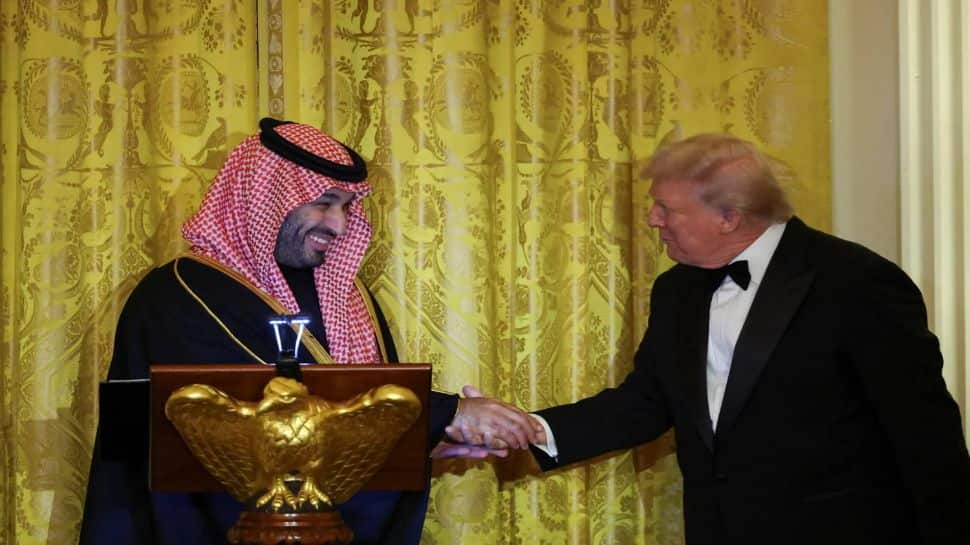On a significant evening in Washington, D.C., President Donald Trump delivered a powerful message underscoring a new chapter in U.S.-Saudi relations, signaling a shift in longstanding U.S. policies in the Middle East. Speaking at the US-Saudi Investment Forum, Trump announced the United States’ intent to sell Saudi Arabia some of the most advanced military equipment ever produced, including the F-35 stealth fighter jets. This decision marks a notable departure from previous U.S. policies that have traditionally ensured Israel’s exclusive access to the most sophisticated American-made defense systems in the region.
President Trump emphasized the deepening strategic partnership between the United States and Saudi Arabia, calling the Kingdom’s recent designation as a major non-NATO ally “a sign of trust.” He highlighted the signing of a historic strategic defense agreement that paves the way for enhanced defense cooperation. Trump proudly noted the range of military hardware involved, including nearly 300 American-made tanks and advanced aircraft, applauded by the audience of American and Saudi business leaders.
This accelerated defense cooperation is closely linked to a shared stance against Iran’s nuclear ambitions. Trump referenced a bold U.S. military operation earlier in the year that targeted Iran’s nuclear program, describing it in vivid detail. He recounted how B-2 stealth bombers, flying undetected, precisely struck critical underground sites, effectively eliminating a significant threat. Trump framed this event as lifting “the dark cloud” of Iran’s nuclear capability from the Middle East, which he suggested has opened the door for new diplomatic possibilities with Tehran.
Beyond military cooperation, Trump also underscored the breadth of economic and technological agreements forged during the week’s engagements. He described these pacts as “groundbreaking,” covering areas such as civil nuclear energy, critical minerals, and artificial intelligence. Trump expressed gratitude to the Saudi delegation for their “extraordinary show of confidence” in the American economy, noting that Saudi Arabia’s investments in the U.S. have grown dramatically. From a $600 billion commitment announced during his visit to Riyadh the previous year, the Crown Prince recently declared plans to invest $1 trillion in the U.S. economy. Trump mentioned that agreements and sales worth approximately $270 billion are currently being finalized across multiple industries, promising significant job creation and economic opportunities for American workers.
The ceremonial nature of the Saudi Crown Prince Mohammed bin Salman’s visit to the White House further highlighted the importance of the occasion. The Crown Prince was greeted with honors typically reserved for heads of state: a mounted honor guard, a flyover by six military jets, and a cannon salute on the South Lawn. Trump personally escorted the Crown Prince along the newly established “Presidential Walk of Fame” before welcoming him into the Oval Office, where he was described as “an extremely respected man” and a longtime friend.
Inside the Oval Office, discussions touched on one of the most sensitive and closely watched diplomatic issues in the Middle East: the Abraham Accords and the future of Israeli-Palestinian peace. The Crown Prince made a clear statement signaling a major shift in Saudi Arabia’s regional posture. He expressed the Kingdom’s desire to be part of the regional peace process, emphasizing a commitment to securing a “clear path to a two-state solution.” He affirmed Saudi Arabia’s wish for peaceful coexistence between Israel and Palestine and pledged efforts to help broker a lasting agreement.
President Trump’s announcement that the U.S. was preparing to sell F-35 stealth aircraft to Saudi Arabia is expected to reverberate throughout regional security circles in Tel Aviv, Abu Dhabi, and beyond. The F-35 jets have long been considered exclusive to Israel among U.S. partners in the Middle East, ensuring that Israel maintains its “qualitative military edge” in the region. Though U.S. officials have reiterated their commitment to preserving this edge, the decision to sell the jets to Saudi Arabia marks a significant policy shift and reflects the scale of the new defense partnership Trump aims to solidify with Riyadh.
This landmark sale is emblematic of the broader transformation in U.S.-Saudi relations under the current administration. It not only reflects shared security concerns, particularly regarding Iran, but also a mutual interest in fostering economic growth and technological innovation. The agreements signed between the two countries demonstrate a comprehensive approach that blends military cooperation with economic and technological partnerships, signaling a long-term strategic alliance.
Trump’s remarks conveyed a sense of optimism about the future of the Middle East, framed around the elimination of the Iranian nuclear threat and the potential for new diplomatic breakthroughs

